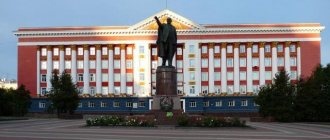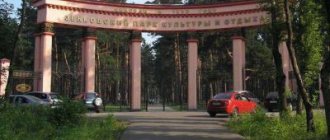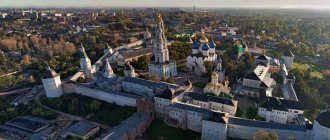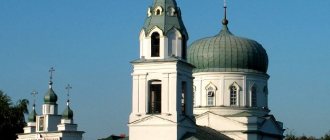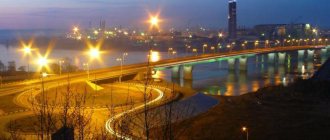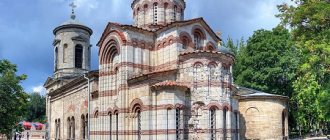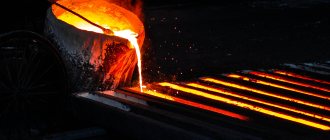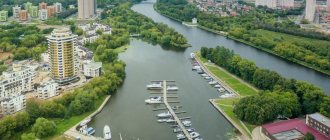This term has other meanings, see Jubilee.
Microdistrict
| Anniversary | |
| City: | Korolev |
| Date of foundation: | 1972 |
| Previous status: | City of regional subordination |
| Year of inclusion within the city: | 2014 |
| Previous names: | until 1992 - Bolshevo-1 |
| Ethnic burial: | Anniversary people, Anniversary citizen, Anniversary woman |
| Postal codes: | 141090—141092 |
| Square: | 3 km² |
| Population: | ↘32,737[1] people (2015) |
| Telephone codes: | 495, 498 |
| Jubilee on Wikimedia Commons | |
| Coordinates: 55°56′ N. w. 37°51′ E. long / 55.933° north w. 37.850° E. d. / 55.933; 37.850 (G) [www.openstreetmap.org/?mlat=55.933&mlon=37.850&zoom=12 (O)] (I) | |
Anniversary
- microdistrict[2] of the city of Korolev, Moscow region of Russia, until June 2, 2014, an independent city of regional subordination[3], which formed a separate municipal entity “Yubileiny Urban District”[4].
Population - 32,737[1] people. (2015).
Story
The history of Yubileiny begins in September 1939, when the Moscow Military Engineering School was opened in Bolshevo, which was relocated to Leningrad in 1946. In its place, the 4th Research Institute of the Ministry of Defense (development of rocket and space technology) began to function in the same year. In the 1950s, construction of the first closed camp for military scientists was completed. In the 1960s, a new closed military camp was built nearby, which began to be called the second. In 1963, the holiday village of Bolshevo, with the exception of the territories of closed military camps, was included in Kaliningrad (the name of the city of Korolev in those years)[6]. In 1972, the 50th Central Research Institute of Military Space Forces named after. M.K. Tikhonravova. In 1972, the military camps received the status of a closed workers' settlement and the code name Bolshevo-1.
In 1986, the “closed” status was removed from the village. On May 25, 1992, the village of Bolshevo-1 was classified as a city of regional subordination with the name Yubileiny city[6]. In 1997, two central research institutes were merged into one.
On November 29, 2013, the governor of the Moscow region, Andrei Vorobyov, announced plans to unite Yubileiny and Korolev into a single urban district in 2014[7]. He cited the lack of space for the development of Korolev as the reason for the merger. The governor did not rule out the possibility that the territories of adjacent municipalities would be annexed to the united district[7].
On May 15, 2014, in the final reading, deputies of the Moscow Regional Duma approved the law on the unification of the cities of Korolev and Yubileiny into an administrative-territorial unit of the Moscow region - a city of regional subordination of the Moscow region, preserving the name “Korolev”[3].
Living in Yubileiny: calling the streets “towns” and rooting for Papaninskaya Dacha
Yubileyny has changed several names over its short history, and in 2014 it turned from a city into a microdistrict of the Korolev urban district. The indigenous residents of Yubileiny from military families still call the microdistricts “small towns”, the local recreation center - the House of Officers, and the shopping center - Voentorg, and are also proud of their intelligent neighbors - the kings. Native resident Ekaterina told RIAMO about how modern Yubileiny lives and what has changed after the merger with Korolev.
Children of a military camp
© RIAMO, Nikolay Koreshkov
Our family ended up in Yubileiny in 1986, where my father, a military man, was given an apartment. Then our city was called the village of Bolshevo-1, and it became Yubileiny only in the early 90s. Well, now we are the Korolev microdistrict. By the way, until 1986 Bolshevo-1 had the status of a closed village.
The indigenous inhabitants of Yubileiny are the children and grandchildren of the military, and the kings are the descendants of scientists and workers in the space industry. We have always prided ourselves on the fact that intelligent people live in both Yubileiny and Korolev.
We still have a lot of children and grandchildren of military personnel; it seems to me that this is approximately two-thirds of the population. When I meet new people, it turns out that they have been living here since the 80s, and also from military families.
I remember the time when there were no street names in Yubileiny, but only “small towns,” until 1997. “Town three, house such and such” - and everyone understood what was going on. There were four towns in total. Many people, including me, can still name not the street, but the town number as a reference point.
Knowing the boundaries of the “towns” is what immediately identifies the locals. But I still don’t know the names of all the streets.
Living in Serebryanye Prudy: honoring Soviet traditions and organizing atmospheric photo sessions >>
House of Culture, where the premiere of “Officers” took place
Group of cultural center "Yubileiny" VKontakte
The main street of Yubileiny is Tikhonravova Street. It is named after the scientist and designer in the field of astronautics and rocketry Mikhail Tikhonravov, the creator of the first Soviet liquid-propellant rocket.
The main attractions are located on this street, among them the garrison House of Officers (now the Yubileiny Palace of Culture), built in the 60s. This building once hosted the premiere of the legendary film “Officers” of 1971, which is loved by all military personnel, starring the legendary Vasily Lanov, Alina Pokrovskaya and Georgy Yumatov.
Once upon a time, life was in full swing here; there were kilometer-long queues for tickets to film premieres. Nowadays, various “travelling” circuses put on shows in the old “old-school” cinema hall. Here, on Tikhonravova, there is a modest local history museum dedicated to the recent history of Yubileiny.
Live in Balashikha - walk in Gorenki and return from Moscow by taxi>>
Papaninskaya dacha
© RIA Novosti, Ivan Shagin
The main cultural value of Yubileiny is Papaninskaya dacha. It belonged to the famous Arctic explorer and twice Hero of the Soviet Union Ivan Dmitrievich Papanin. But, alas, you cannot show the legendary Papanin’s dacha to children and tourists - for many years this territory and historical buildings have been hidden behind a solid fence.
Today, the vast territory of the Papaninskaya dacha is federal property. As far as I know, several private cottages have already been built there. For many years, residents of Yubileiny have been fighting for a park to be built on this territory and a museum to be opened in memory of the outstanding polar explorer. But so far no decision has been made in favor of the residents.
My relative heard Papanin himself, speaking many years ago from the stage in front of city residents, talking about how he wanted to leave his dacha to the city. And such a place would really become the heart of the city, we really miss this.
In Yubileiny, unlike Korolev or Mytishchi, there are no decent parks and cultural centers. A small square with an ice cream stand and a half-abandoned park near the Bolshevo platform, which was chosen by tired workers with beer - these are all the places to relax in Yubileiny.
On the territory of the Papaninskaya dacha it would be possible to make an excellent place for family recreation and a cultural center dedicated to the life of the legendary man Ivan Papanin. But residents, continuing to discuss this topic, are almost desperate and do not hope for a successful outcome.
Living in Zhukovsky: loving the noise of airplanes and taking excursions>>
Royal "Vatican"
© RIAMO, Ivan Vodopyanov
Yubileiny is unique in its own way - our city was surrounded on all sides by the territory of Korolev. Some blogger compared it to the Vatican because of this feature. Of course, the unification had to happen sooner or later.
Most residents, including myself, reacted positively to the merger of Yubileiny and Korolev in 2014. After the merger, we saw how little by little our Yubileiny began to catch up to the level of improvement of Korolev.
Excellent playgrounds with safe surfaces began to appear in courtyards, trees began to be planted, and sidewalks were put in order. Various problems in the housing and communal services sector began to be solved much faster.
Instagram page of Alexander Khodyrev
The Korolev Unified City Dispatch Service has appeared, which accepts all applications and works very quickly. For example, if the sidewalks are covered with snow and children have difficulty getting to school, I leave a request, and within a few hours the problem is solved.
But there are also disadvantages. The ambulance, for example, began to take longer to travel than before. From the words of elderly acquaintances, I know that an ambulance can take up to 40 minutes to get to a call, because it comes to us from Korolev.
For me, as the daughter of a military man, Korolev and Yubileyny have essentially always been one. Although it was believed that Korolev was more comfortable and comfortable to live in. But I decided for myself that I would not want to live in Korolev. The building density there is very high, and, accordingly, royal children wait longer in line for kindergarten. In addition, Yubileiny is greener than Korolev.
New housing is being built in both Korolev and Yubileiny. Just a few years ago, the long-term construction of our city was “unfrozen” - the Lesnaya Korona residential complex, now it is the First Yubileiny residential complex. These are four buildings of 17 floors each, new residents are already moving in there.
Living in Odintsovo means being on “active maternity leave” and not going to Moscow>>
"Star" dachas
© RIAMO, Ksenia Sidorova
I am a city resident, and I feel comfortable in Yubileiny. At the same time, many of my relatives and friends live in the private sector of Korolev. And it’s very cool to live in nature, and at the same time enjoy all the benefits of city civilization. You can get a big dog, plant roses, and have children outdoors all day. But this event is quite expensive. In dacha settlements near Yubileiny, it will be cheaper to buy land and build than in the royal old dacha areas.
Within the boundaries of Korolev there is the famous Valentinovka, which was chosen by the Soviet intelligentsia back in the 30s of the last century. There are dachas of Nikolai Karachentsov, Andrei Makarevich, Alexander Kalyagin and other celebrities. “Christmas Meetings” by Alla Pugacheva was filmed at Valery Leontyev’s dacha in Valentinovka. Another famous summer resident of Valentinovka, Yuri Nikulin, loved her very much.
The cost of land in Valentinovka varies, but a small plot in this legendary place will in any case cost the same as a normal “kopeck piece” with all the amenities in the same Yubileiny.
Living in Mytishchi: dreaming of a metro and being proud of the water supply>>
Expensive market and take-home rolls
Personal archive
I buy products both in chain stores and at the grocery market. Many people shop for a week in advance at the Globus hypermarket, located in the royal part, about 15 minutes from us along Yaroslavka.
By the way, the market in Yubileiny has become quite civilized, but very expensive. For example, selected market tomatoes in our market will cost more than in the Korolev market. Therefore, for “natural products” we go not to our own market, but to the royal one.
What I miss in Yubileiny is a normal shopping center, so that you can buy everything you need in one place. It seems that everything is there, but you have to look for everything in different shops in different parts of the microdistrict. There are more than one such shopping centers in Korolev, but we don’t have them.
There is still a lack of truly quality family restaurants. There are various establishments, but I am not delighted with them. Usually our friends and acquaintances order delivery of pizza or rolls and have parties at home.
Live in Ramenskoye: be proud of the colorful houses and love electric trains>>
From school to Baumanka and Moscow State University
© Yubileiny news agency, Maxim Rasskazchikov
The situation with schools and kindergartens in Yubileiny is much better than in Korolev. Our children enter kindergarten at 3 years old, or even earlier.
There are two excellent gymnasiums in Yubileiny - numbers 3 and 5, my son studies in one of them, and we are happy. There are two more secondary schools, but the level of education there is average.
The success of gymnasium graduates can be judged by the honor board and reviews of friends. They easily enter the best Moscow universities - Moscow State University, MEPhI, Baumanka and even the coolest foreign universities.
Infrastructure
| : Incorrect or missing image | This section is missing references to information sources. Information must be verifiable, otherwise it may be questioned and deleted. You may edit this article to include links to authoritative sources. |
K: Wikipedia: Articles without sources (type: not specified)
Main enterprises of the microdistrict:
- 4 Central Research Institute of the Ministry of Defense of the Russian Federation,
- Research Institute of Space Systems named after. A. A. Maksimova - branch of the State Research and Production Space Center named after. Khrunicheva
- other research and construction organizations.
There are six kindergartens in the microdistrict, all of which have the status of “Child Development Center”. Two gymnasiums, a lyceum, two secondary schools, an art school, a music school, a children's school. In 2007, the Orbita stadium was opened; in 2012, by the decision of the Council of Deputies, the stadium was returned to its original name, Chaika Stadium. There is a city clinic and hospital.
The garrison officers' house was transferred to the municipality and renamed the House of Culture. History and Art Museum, opened in 1998 and has a collection of military vehicles; the building is in poor condition.
Population[ | ]
| Population | |||||||
| 1995 | 1996[10] | 1998[10] | 2000[10] | 2001[10] | 2002[11] | 2003[10] | 2004 |
| 34 000 | ↘26 500 | ↗27 000 | ↗27 500 | ↗27 600 | ↗30 837 | ↘30 800 | ↗31 000 |
| 2005[10] | 2006[10] | 2007[10] | 2008[10] | 2009[12] | 2010[13] | 2011[10] | 2012[14] |
| ↗31 400 | ↗31 600 | ↗32 100 | ↗32 300 | ↗32 492 | ↗33 237 | ↘33 200 | ↗33 381 |
| 2013[15] | 2014[16] | 2015[1] | |||||
| ↘33 078 | ↘32 940 | ↘32 737 | |||||
Internal division
- Town 1: Streets of Heroev Kursantov, K.D. Trofimova, M.K. Tikhonravova, Garage deadlock, Institutsky proezd.
- Town 2: Streets A. I. Nesterenko, A. I. Tikhomirova, Bolshaya Komitetskaya, Military Builders, Zavodskaya, I. D. Papanin, Komitetskaya, Leninskaya, Malaya Komitetskaya, M. M. Glinkin, Mayakovsky, M. K. Tikhonravov , Leninsky and Shkolny passages.
- Town 3: Streets A.I. Sokolov, Leninskaya, Lesnaya, Malaya Komitetskaya, Mayakovskogo, Parkovaya, Pionerskaya, Pushkinskaya, M.K. Tikhonravova
mass media
The newspapers “Sputnik”, “Bolshevskie Vesti” and “City Assembly” are published; the last two publications have not been published since the March 2012 elections.
The TV channel "TV-Yubileiny" (MU "Information Center") operated from 2001 to 2012. The TV channel was closed due to the founder - the head of the city of Yubileiny - changing the form of establishment from MU to UIA and a complete exclusion from the Charter of journalistic activity. Television broadcasting is provided by the Municipal Autonomous Cable Institution of Yubileiny and Pentabox LLC.
Transport
On the eastern border of the city there is the fourth platform of the Bolshevo station (Fryazino direction), from which there is a direct train connection with Moscow.
Buses
- 12 (st. Podlipki - Forest School - st. Bolshevo)[14]
- 13 (station Podlipki - Forest School - station Bolshevo - station Podlipki)
- 15 (station Podlipki - Gorodok 3 - station Bolshevo)[15]
- 16 (station Podlipki - Forest School)[16]
- 499 (st. Bolshevo - Gorodok 3 - Moscow (metro station VDNKh))[17]
Route taxis
- 13 (st. Podlipki - Forest School - st. Bolshevo - st. Podlipki)[18]
- 15 (station Podlipki - Gorodok 3)[19]
- 16 (station Podlipki - Forest School)[16]
- 19 (Town 1 - Town 2)[20]
- 551 (Lesnye Polyany (Polyanka microdistrict) - Forest School - Moscow (metro station VDNKh))[21]
Transport[ | ]
On the eastern border of the microdistrict there is the fourth platform of the Bolshevo station (Fryazino direction), from which there is a direct railway connection with Moscow.
Buses[ | ]
- 12
(st. Podlipki - Forest School - st. Bolshevo)[17] - 13
(st. Podlipki - Forest School - st. Bolshevo - st. Podlipki) - 15
(Podlipki station - Gorodok 3 - Bolshevo station - Globus hypermarket)[18] - 16
(station Podlipki - Forest School)[19] - 499
(st. Bolshevo - Gorodok 3 - Moscow (06 VDNKh))[20]
Route taxis[ | ]
- 13
(st. Podlipki - Forest School - st. Bolshevo - st. Podlipki)[21] - 15
(station Podlipki - Gorodok 3)[22] - 16
(station Podlipki - Forest School)[19] - 19
(Geroev Kursantov St. - Bolshevo station (Nesterenko St.) - Pionerskaya St. (Yubileiny) - Gorodok 3 - Podlipki station) - 551k
(Forest Glades (Polyanka microdistrict) - Forest School - Moscow (06 VDNKh))
Power
| : Incorrect or missing image | This section is missing references to information sources. Information must be verifiable, otherwise it may be questioned and deleted. You may edit this article to include links to authoritative sources. |
K: Wikipedia: Articles without sources (type: not specified)
Head of the City Administration:
- Golubov Boris Ignatievich (until 2003)
- Kirpichev Valery Viktorovich (from December 2003 to 2014)
How to get to Yubileiny?
The village of Yubileiny is located 200 km from Perm and 400 km from Yekaterinburg.
From Perm you need to go along the Solikamsky tract to Polazna, then to Chusovaya, pass Gremyachinsk and after the village of Usva turn right from the highway - to Yubileiny.
From Yekaterinburg, go along the Serovsky tract, turn to Kachkanar, then to Gornozavodsk. Before Chusov, turn onto Gubakha, then as described above. The map below will help you navigate.
Along the way, you can get acquainted with another endangered village - Shumikhinsky, located nearby. You can also see the Shumikha Rocks there. Also during the trip you can visit such attractions as White Stones, Stone Town, Usvinskie Pillars.
If you return to the highway and drive a little further, you will find yourself in the ghost town of Verkhnyaya Gubakha and the endangered mining town of Kizel.
Vladislav Timofeev
UraloVed.ru
Honorary citizens of the city
- Alekseev Eduard ViktorovichK: Wikipedia: Articles without sources (type: not specified) [ source not specified 3627 days
] - Major General, Doctor of Technical Sciences, Professor, Honored Worker of Science and Technology of the Russian Federation. Head of the 50th Central Research Institute KS MO from 1988 to 1993. From 1999 to 2007, he headed the Council of Veterans of War, Labor, Armed Forces and Law Enforcement Agencies of the city of Yubileiny - Bezrukov Alexey Semyonovich[22] - chief physician of the 2nd Central Military Clinical Hospital named after P.V. Mandryk, colonel of the medical service, Honored Doctor of the Russian Federation.
- Volkov Evgeniy Borisovich[22] - lieutenant general, doctor of technical sciences, professor, honored worker of science and technology of the RSFSR, Hero of socialist labor. Head of NII-4 MO from 1970 to 1982.
- Volkov Lev Ivanovich[22] - Lieutenant General, Doctor of Technical Sciences, Professor, Honored Worker of Science and Technology of the RSFSR, State Prize Laureate. Head of the 4th Central Research Institute of the Moscow Region from 1982 to 1993.
- Golubov Boris Ignatievich[22] - Chairman of the executive committee of the village council of the village of Bolshevo-1 since 1990. Head of the Yubileiny city administration since 1992. Head of the city of Yubileiny from 1996 to 2003.
- Dvorkin, Vladimir Zinovievich[22] - major general, doctor of technical sciences, professor. Head of the 4th Central Research Institute of the Moscow Region from 1993 to 2001.
- Mardirosova Elizaveta Georgievna[22] - general practitioner at the city clinic from 1980 to 1998. Head of the second therapeutic department from 1999 to 2003.
- Ziborova Anna Danilovna - chairman of the executive committee of the village council of deputies of the village of Bolshevo-1
- Menshikov Valery Aleksandrovich[22] - Major General, Doctor of Technical Sciences, Professor, Honored Scientist of the Russian Federation. Head of the 50th Central Research Institute KS MO from 1993 to 1997. Director of the Research Institute of CS named after A. A. Maksimov - a branch of the State Research and Production Space Center named after. M.V. Khrunichev from 1998 to 2011.
- Meshcheryakov Ivan Vasilievich[22] - Lieutenant General, Doctor of Technical Sciences, Professor, Honored Worker of Science and Technology of the RSFSR, State Prize Laureate, Hero of Socialist Labor. Head of the 50th Central Research Institute KS MO from 1983 to 1988.
- Mitropolsky Sergei Fedorovich[22] - colonel, veteran of the Great Patriotic War.
- Sokolov Andrey Illarionovich[22] - lieutenant general, doctor of technical sciences, laureate of the Lenin Prize. Head of NII-4 MO from 1955 to 1970.
- Tikhonravov Mikhail Klavdievich[22] - engineer, creator of the first artificial Earth satellite, Hero of Socialist Labor.
- Chernyshev Nikolai Gavrilovich[22] - engineer-colonel, doctor of technical sciences. Head of the department of Research Institute-4 of the Moscow Region from November 1946 to January 1953. Pioneer of domestic rocket science. A crater on the Moon is named after him.
Notes
- ↑ 123
Dead end Garage Streets A. I. Nesterenko · A. I. Sokolova
·
A. I. Tikhomirova
·
Bolshaya Komitetskaya
·
Military builders
·
Heroes of Cadets
·
Factory
·
I. D. Papanina
·
K. D. Trofimova
·
Committee
·
Leninskaya
·
Lesnaya
·
Malaya Komitetskaya
·
M. M. Glinkina
·
Mayakovsky
·
Parkovaya
·
Pionerskaya
·
Pushkinskaya
·
TikhonravovaKorolev streets by neighborhood: Bolshevo | Pervomaisky | Textile worker | Peat enterprise | Center | Anniversary
An excerpt characterizing Yubileiny (Korolev)
- Chinenka! - the soldier shouted at the approaching grenade flying with a whistle. - Not here! To the infantry! – another added with laughter, noticing that the grenade flew over and hit the covering ranks. - What, friend? - another soldier laughed at the man who crouched under the flying cannonball. Several soldiers gathered at the rampart, looking at what was happening ahead. “And they took off the chain, you see, they went back,” they said, pointing across the shaft. “Mind your job,” the old non-commissioned officer shouted at them. “We’ve gone back, so it’s time to go back.” - And the non-commissioned officer, taking one of the soldiers by the shoulder, pushed him with his knee. There was laughter. - Roll towards the fifth gun! - they shouted from one side. “At once, more amicably, in the burlatsky style,” the cheerful cries of those changing the gun were heard. “Oh, I almost knocked off our master’s hat,” the red-faced joker laughed at Pierre, showing his teeth. “Eh, clumsy,” he added reproachfully to the cannonball that hit the wheel and the man’s leg. - Come on, you foxes! - another laughed at the bending militiamen entering the battery behind the wounded man. - Isn’t the porridge tasty? Oh, the crows, they slaughtered! - they shouted at the militia, who hesitated in front of the soldier with a severed leg. “That’s something, little guy,” they mimicked the men. – They don’t like passion. Pierre noticed how after each cannonball that hit, after each loss, the general revival flared up more and more. As if from an approaching thundercloud, more and more often, lighter and brighter, lightning of a hidden, flaring fire flashed on the faces of all these people (as if in rebuff to what was happening). Pierre did not look forward to the battlefield and was not interested in knowing what was happening there: he was completely absorbed in the contemplation of this increasingly flaring fire, which in the same way (he felt) was flaring up in his soul. At ten o'clock the infantry soldiers who were in front of the battery in the bushes and along the Kamenka River retreated. From the battery it was visible how they ran back past it, carrying the wounded on their guns. Some general with his retinue entered the mound and, after talking with the colonel, looked angrily at Pierre, went down again, ordering the infantry cover stationed behind the battery to lie down so as to be less exposed to shots. Following this, a drum and command shouts were heard in the ranks of the infantry, to the right of the battery, and from the battery it was visible how the ranks of the infantry moved forward. Pierre looked through the shaft. One face in particular caught his eye. It was an officer who, with a pale young face, walked backwards, carrying a lowered sword, and looked around uneasily. The rows of infantry soldiers disappeared into the smoke, and their prolonged screams and frequent gunfire could be heard. A few minutes later, crowds of wounded and stretchers passed from there. Shells began to hit the battery even more often. Several people lay uncleaned. The soldiers moved more busily and more animatedly around the guns. Nobody paid attention to Pierre anymore. Once or twice they shouted at him angrily for being on the road. The senior officer, with a frowning face, moved with large, fast steps from one gun to another. The young officer, flushed even more, commanded the soldiers even more diligently. The soldiers fired, turned, loaded, and did their job with tense panache. They bounced as they walked, as if on springs. A thundercloud had moved in, and the fire that Pierre had been watching burned brightly in all their faces. He stood next to the senior officer. The young officer ran up to the elder officer, with his hand on his shako. - I have the honor to report, Mr. Colonel, there are only eight charges, would you order to continue firing? - he asked. - Buckshot! - Without answering, the senior officer shouted, looking through the rampart. Suddenly something happened; The officer gasped and, curling up, sat down on the ground, like a shot bird in flight. Everything became strange, unclear and cloudy in Pierre’s eyes. One after another, the cannonballs whistled and hit the parapet, the soldiers, and the cannons. Pierre, who had not heard these sounds before, now only heard these sounds alone. To the side of the battery, on the right, the soldiers were running, shouting “Hurray,” not forward, but backward, as it seemed to Pierre. The cannonball hit the very edge of the shaft in front of which Pierre stood, sprinkled earth, and a black ball flashed in his eyes, and at the same instant it smacked into something. The militia who had entered the battery ran back. - All with buckshot! - the officer shouted. The non-commissioned officer ran up to the senior officer and in a frightened whisper (as a butler reports to his owner at dinner that there is no more wine required) said that there were no more charges. - Robbers, what are they doing! - the officer shouted, turning to Pierre. The senior officer's face was red and sweaty, his frowning eyes sparkling. – Run to the reserves, bring the boxes! - he shouted, angrily looking around Pierre and turning to his soldier. “I’ll go,” said Pierre. The officer, without answering him, walked in the other direction with long steps. – Don’t shoot... Wait! - he shouted. The soldier, who was ordered to go for the charges, collided with Pierre. “Eh, master, there’s no place for you here,” he said and ran downstairs. Pierre ran after the soldier, going around the place where the young officer was sitting. One, another, a third cannonball flew over him, hitting in front, from the sides, from behind. Pierre ran downstairs. "Where am I going?" - he suddenly remembered, already running up to the green boxes. He stopped, undecided whether to go back or forward. Suddenly a terrible shock threw him back to the ground. At the same instant, the brilliance of a large fire illuminated him, and at the same instant a deafening thunder, crackling and whistling sound rang in his ears. Pierre, having woken up, was sitting on his backside, leaning his hands on the ground; the box he was near was not there; only green burnt boards and rags were lying on the scorched grass, and the horse, shaking its shaft with fragments, galloped away from him, and the other, like Pierre himself, lay on the ground and squealed shrilly, protractedly. Pierre, unconscious from fear, jumped up and ran back to the battery, as the only refuge from all the horrors that surrounded him. While Pierre was entering the trench, he noticed that no shots were heard at the battery, but some people were doing something there. Pierre did not have time to understand what kind of people they were. He saw the senior colonel lying with his back to him on the rampart, as if examining something below, and he saw one soldier he noticed, who, breaking forward from the people holding his hand, shouted: “Brothers!” – and saw something else strange. But he had not yet had time to realize that the colonel had been killed, that the one shouting “brothers!” There was a prisoner who, in front of his eyes, was bayoneted in the back by another soldier. As soon as he ran into the trench, a thin, yellow, sweaty-faced man in a blue uniform, with a sword in his hand, ran at him, shouting something. Pierre, instinctively defending himself from the push, since they, without seeing, ran away from each other, put out his hands and grabbed this man (it was a French officer) with one hand by the shoulder, with the other by the proud. The officer, releasing his sword, grabbed Pierre by the collar. For several seconds, they both looked with frightened eyes at faces alien to each other, and both were at a loss about what they had done and what they should do. “Am I taken prisoner or is he taken prisoner by me? - thought each of them. But, obviously, the French officer was more inclined to think that he had been taken prisoner, because Pierre’s strong hand, driven by involuntary fear, squeezed his throat tighter and tighter. The Frenchman wanted to say something, when suddenly a cannonball whistled low and terribly above their heads, and it seemed to Pierre that the French officer’s head had been torn off: he bent it so quickly. Pierre also bowed his head and let go of his hands. Without thinking any more about who took whom prisoner, the Frenchman ran back to the battery, and Pierre went downhill, stumbling over the dead and wounded, who seemed to him to be catching his legs. But before he had time to go down, dense crowds of fleeing Russian soldiers appeared towards him, who, falling, stumbling and screaming, ran joyfully and violently towards the battery. (This was the attack that Ermolov attributed to himself, saying that only his courage and happiness could have accomplished this feat, and the attack in which he allegedly threw the St. George crosses that were in his pocket onto the mound.) The French who occupied battery, let's run. Our troops, shouting “Hurray,” drove the French so far behind the battery that it was difficult to stop them. Prisoners were taken from the battery, including a wounded French general, who was surrounded by officers. Crowds of wounded, familiar and unfamiliar to Pierre, Russians and French, with faces disfigured by suffering, walked, crawled and rushed from the battery on stretchers. Pierre entered the mound, where he spent more than an hour, and from the family circle that accepted him, he did not find anyone. There were many dead here, unknown to him. But he recognized some. The young officer sat, still curled up, at the edge of the shaft, in a pool of blood. The red-faced soldier was still twitching, but they did not remove him. Pierre ran downstairs. “No, now they will leave it, now they will be horrified by what they did!” - thought Pierre, aimlessly following the crowds of stretchers moving from the battlefield. But the sun, obscured by smoke, still stood high, and in front, and especially to the left of Semyonovsky, something was boiling in the smoke, and the roar of shots, shooting and cannonade not only did not weaken, but intensified to the point of despair, like a man who, straining himself, screams with all his might. The main action of the Battle of Borodino took place in the space of a thousand fathoms between Borodin and Bagration’s flushes. (Outside this space, on the one hand, the Russians made a demonstration by Uvarov's cavalry in mid-day; on the other hand, behind Utitsa, there was a clash between Poniatowski and Tuchkov; but these were two separate and weak actions in comparison with what happened in the middle of the battlefield. ) On the field between Borodin and the flushes, near the forest, in an open area visible from both sides, the main action of the battle took place, in the most simple, ingenuous way. The battle began with a cannonade from both sides from several hundred guns. Then, when the smoke covered the entire field, in this smoke two divisions moved (from the French side) on the right, Desse and Compana, on fléches, and on the left, the regiments of the Viceroy to Borodino. From the Shevardinsky redoubt, on which Napoleon stood, the flashes were at a distance of a mile, and Borodino was more than two miles away in a straight line, and therefore Napoleon could not see what was happening there, especially since the smoke, merging with the fog, hid all terrain. The soldiers of Dessay's division, aimed at the flushes, were visible only until they descended under the ravine that separated them from the flushes. As soon as they descended into the ravine, the smoke of cannon and rifle shots on the flashes became so thick that it covered the entire rise of that side of the ravine. Something black flashed through the smoke - probably people, and sometimes the shine of bayonets. But whether they were moving or standing, whether they were French or Russian, could not be seen from the Shevardinsky redoubt. The sun rose brightly and slanted its rays straight into the face of Napoleon, who was looking from under his hand at the flushes. Smoke lay in front of the flushes, and sometimes it seemed that the smoke was moving, sometimes it seemed that the troops were moving. People's screams could sometimes be heard behind the shots, but it was impossible to know what they were doing there. Napoleon, standing on the mound, looked into the chimney, and through the small circle of the chimney he saw smoke and people, sometimes his own, sometimes Russians; but where what he saw was, he did not know when he looked again with his simple eye. He came down from the mound and began to walk back and forth in front of him. From time to time he stopped, listened to the shots and peered into the battlefield. Not only from the place below where he stood, not only from the mound on which some of his generals now stood, but also from the very flashes on which were now together and alternately the Russians, the French, the dead, the wounded and the living, frightened or distraught soldiers, it was impossible to understand what was happening in this place. For several hours at this place, amid incessant shooting, rifle and cannon fire, first Russians, sometimes French, sometimes infantry, sometimes cavalry soldiers appeared; appeared, fell, shot, collided, not knowing what to do with each other, screamed and ran back. From the battlefield, his sent adjutants and orderlies of his marshals constantly jumped to Napoleon with reports on the progress of the case; but all these reports were false: both because in the heat of battle it is impossible to say what is happening at a given moment, and because many adjutants did not reach the real place of the battle, but conveyed what they heard from others; and also because while the adjutant was driving through the two or three miles that separated him from Napoleon, circumstances changed and the news he was carrying was already becoming incorrect. So an adjutant galloped up from the Viceroy with the news that Borodino had been occupied and the bridge to Kolocha was in the hands of the French. The adjutant asked Napoleon if he would order the troops to move? Napoleon ordered to line up on the other side and wait; but not only while Napoleon was giving this order, but even when the adjutant had just left Borodino, the bridge had already been recaptured and burned by the Russians, in the very battle in which Pierre took part at the very beginning of the battle.
